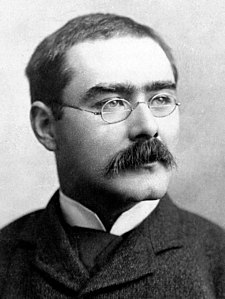Rudyard Kipling
| Rudyard Kipling | |
|---|---|

Kipling in 1915
|
|
| Born | Joseph Rudyard Kipling 30 December 1865 Bombay, Bombay Presidency, British India |
| Died | 18 January 1936 (aged 70) London, England |
| Resting place | Poets' Corner, Westminster Abbey, London |
| Occupation | Short-story writer, novelist, poet, journalist |
| Nationality | British |
| Genre | Short story, novel, children's literature, poetry, travel literature, science fiction |
| Notable works |
The Jungle Book Just So Stories Kim Captains Courageous "If—" "Gunga Din" "The White Man's Burden" |
| Notable awards |
Nobel Prize in Literature 1907 |
| Spouse | Caroline Starr Balestier (m. 1892) (1862-1939) |
| Children | 3, including Elsie Bambridge and John Kipling |
|
|
|
| Signature | |
Joseph Rudyard Kipling (/ˈrʌdjərd ˈkɪplɪŋ/ RUD-yərd KIP-ling (rhotic) ![]() listen ; 30 December 1865 – 18 January 1936) was an English journalist, short-story writer, poet, and novelist.
listen ; 30 December 1865 – 18 January 1936) was an English journalist, short-story writer, poet, and novelist.
Kipling's works of fiction include The Jungle Book (1894), Kim (1901), and many short stories, including "The Man Who Would Be King" (1888). His poems include "Mandalay" (1890), "Gunga Din" (1890), "The Gods of the Copybook Headings" (1919), "The White Man's Burden" (1899), and "If—" (1910). He is regarded as a major innovator in the art of the short story; his children's books are classics of children's literature, and one critic described his work as exhibiting "a versatile and luminous narrative gift".
...
Wikipedia
